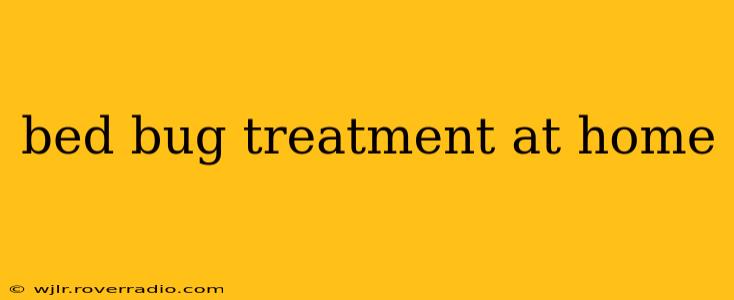Bed bugs. The mere mention sends shivers down many spines. These tiny, nocturnal insects are notorious for their itchy bites and their ability to infest homes with alarming speed. While a professional pest control service is often the most effective solution for a severe infestation, many minor infestations can be successfully treated at home with diligence and the right approach. This comprehensive guide will explore effective home treatments, prevention strategies, and when it's time to call in the professionals.
What are the Signs of a Bed Bug Infestation?
Before you begin treatment, it's crucial to confirm you're dealing with bed bugs. Don't jump to conclusions based on itchy bites alone. Several other insects can cause similar reactions. Look for these telltale signs:
- Live bed bugs: These are small, reddish-brown insects about the size of an apple seed. They are flat when unfed but swell after feeding.
- Bed bug fecal spots: These are tiny, dark brown or black spots that look like ink marks on your mattress, bedding, or walls.
- Bed bug eggs: These are tiny, pearly white ovals, often found in cracks and crevices near the mattress.
- Bed bug shed skins: As bed bugs grow, they shed their exoskeletons, leaving behind small, translucent skins.
- A musty odor: A strong, sweet, musty odor can indicate a large bed bug infestation.
How to Get Rid of Bed Bugs at Home: A Step-by-Step Approach
Treating a bed bug infestation at home requires a multi-pronged approach that combines thorough cleaning, targeted treatments, and persistent monitoring. Here's a step-by-step guide:
1. Thorough Cleaning: The First Line of Defense
- Wash all bedding and clothing in hot water: Use the hottest water setting your washing machine allows (at least 120°F) and dry on high heat for at least 30 minutes to kill bed bugs and their eggs.
- Vacuum thoroughly: Vacuum your mattress, box spring, bed frame, and surrounding areas meticulously, paying close attention to seams, crevices, and any potential hiding spots. Dispose of the vacuum bag immediately in an outdoor trash can.
- Steam clean: A steam cleaner can effectively kill bed bugs and their eggs on mattresses, furniture, and other surfaces. Be sure to follow the manufacturer's instructions carefully.
2. Targeted Treatments: Eliminating Bed Bugs
Several home remedies and over-the-counter products can help eliminate bed bugs. However, it's crucial to follow instructions carefully and be aware of potential safety concerns.
- Diatomaceous earth: This natural powder is non-toxic to humans and pets but dehydrates and kills bed bugs. Sprinkle it liberally in areas where bed bugs are prevalent.
- Over-the-counter insecticides: Numerous sprays and dusts are available, but carefully read labels to ensure they're suitable for your situation and follow instructions precisely.
- Essential oils: Some essential oils, like peppermint oil, tea tree oil, and clove oil, may repel bed bugs, but their effectiveness is not scientifically proven.
3. Monitoring and Prevention: Long-Term Strategies
Even after successful treatment, vigilance is key. Regularly inspect your bed and surrounding areas for signs of bed bugs. Proactive prevention measures are crucial to avoid future infestations:
- Regularly inspect mattresses and bedding: Look for any signs of bed bugs or their fecal matter.
- Encase your mattress and box spring in encasements: These zippered covers prevent bed bugs from accessing your mattress and breeding.
- Reduce clutter: Clutter provides hiding places for bed bugs, so keep your bedroom clean and tidy.
- Inspect luggage carefully: Check your luggage thoroughly before and after traveling to avoid bringing bed bugs home.
What are the Most Effective Home Remedies for Bed Bugs?
While no single home remedy guarantees complete eradication, several show some promise when used as part of a comprehensive treatment plan. Diatomaceous earth, as mentioned above, is a popular and relatively safe option. Other remedies often suggested (though effectiveness varies) include:
- Isopropyl alcohol: Apply directly to bed bugs (with caution, as it can damage some fabrics).
- Baking soda: While not directly insecticidal, its absorbency can help control odors associated with infestations.
Are Home Remedies Enough for a Severe Bed Bug Infestation?
For minor infestations, a diligent home treatment approach might suffice. However, if you have a severe infestation, involving extensive spreading, numerous bites, or you're unable to manage the situation yourself, it's crucial to contact a professional pest control service. Professional pest control technicians have access to more powerful insecticides and treatment strategies, and they can effectively handle large-scale infestations.
How Much Does Professional Bed Bug Treatment Cost?
The cost of professional bed bug treatment varies depending on the severity of the infestation, the size of the treated area, and the pest control company. It's best to get quotes from several companies to compare pricing and services.
When Should I Call a Professional Pest Control Service?
Don't hesitate to contact a professional if:
- The infestation is widespread.
- Home remedies aren't effective.
- You have a large number of bites.
- You're uncomfortable handling the situation yourself.
Remember, early detection and a proactive approach are vital in managing a bed bug infestation. Combining thorough cleaning, targeted treatments, and ongoing monitoring can significantly improve your chances of success. However, professional assistance may be necessary for severe infestations to achieve complete eradication.
